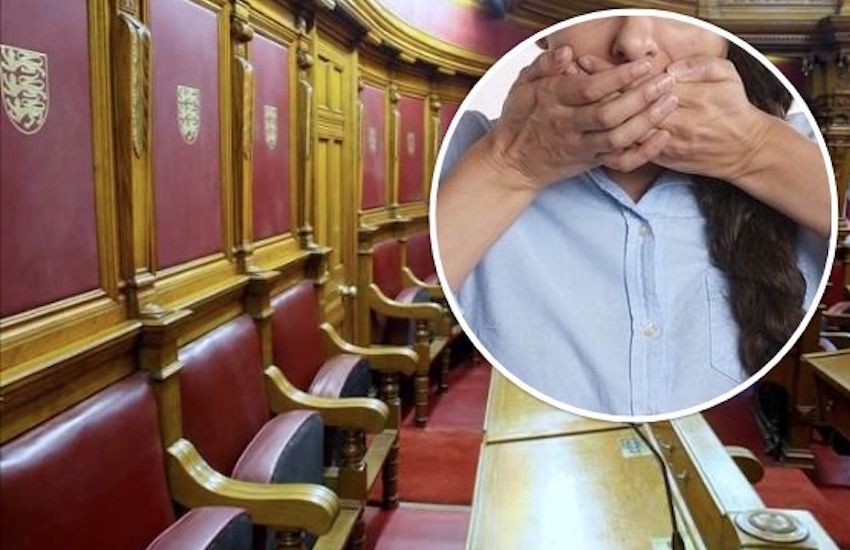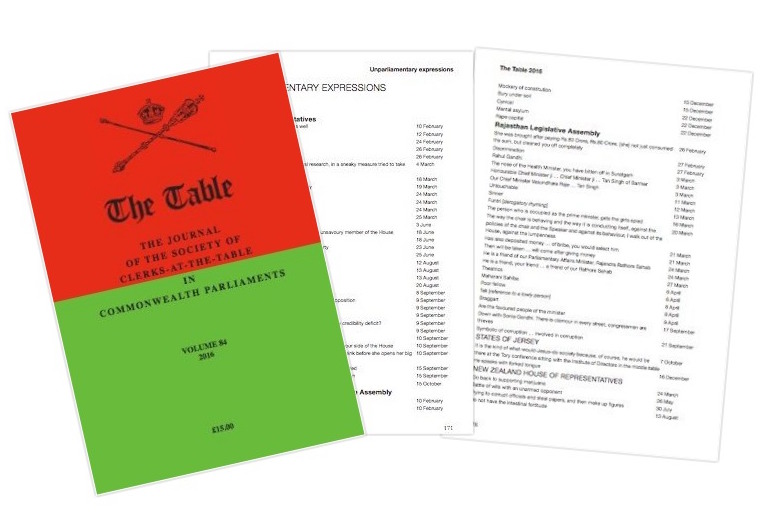


States debates may be known for their hot-headed repartee, but when does political jousting cross from the realms of light banter into the downright unacceptable?
A response to a recent Freedom of Information (FOI) request appears to shed some light on what could see you ejected from the States benches during a sitting.
The request asked how many times States Members have been required to officially withdraw comments deemed to be ‘unparliamentary’ – that is, words that are “offensive, objectionable…or disorderly” according to States Standing Orders.
Use of such language can see politicians verbally slapped on the wrist by the Bailiff, forced to apologise, and/or – in a worst case scenario – be expelled from the Chamber.

Pictured: Unparliamentary expressions are listed in the Journal of the Society of Clerks at the Table in Commonwealth Parliaments.
Such was the case for Deputy Montfort Tadier in 2015 after an unholy row broke out over a quip he had made about Jesus not attending the Conservative Party Conference. It was the first time in years that an elected politician had been expelled from the Assembly and reopened the debate about whether the Bailiff, as the Island’s Chief Judge, should really be presiding over the States Assembly at all.
That comment, the FOI response revealed, was later included in a Commonwealth-wide publication, listing parliamentary slips of the tongue from across the global political community. In fact, Jersey’s government – alongside the rest of the Commonwealth countries – submit their unacceptable phrases every year.
So what made the 2016 cut? From knickers to knackers, here are the humorous exchanges as they happened...
St Saviour Constable Sadie Le Sueur-Rennard was pulled up for her language during a debate on the minimum wage.
Constable of St Saviour: I certainly back Deputy Mézec because I do think that everybody deserves a living wage and if you want to get up off your backside and do something, you deserve to be rewarded for it. But now is not the right time to do it, I am afraid...
The Deputy Bailiff: Connétable, I think “up off your backside” is probably not a parliamentary expression.
The Connétable of St. Saviour: I do apologise. If you want to remove yourself from your posterior on your settee... [Laughter]
The Deputy Bailiff: Connétable, neither is an expression directly in lieu of an unparliamentary expression. [Laughter]
In a debate on outsourcing, Deputy Tadier took a moment to take aim at the current Council of Ministers.
Deputy Tadier: [Mock quoting the Council of Ministers] “…we are not going to cut down on those who take jollies to South Africa and who basically takes the proverbial”, that is the kind of language they would use on the street, Sir...
The Deputy Bailiff: Possibly, Deputy, but it is not the kind of language we use in the Assembly. I wonder if you can withdraw that please.
A speech by Deputy Tadier during the MTFP debate led to this humorous exchange.
Deputy Tadier: If you wanted to perhaps find an expression about the political attitude that we have and perhaps various administrations over the years have had to Jèrriais one might say: “I' n'peuvent pon même trouver lus tchu auve les deux mains.”
The Deputy Bailiff: Deputy, I am going to ask you to translate that into English, because that is not something that I am entirely familiar with.
Deputy M. Tadier: That is right, Sir. Just before I do that, in English we might have an expression which quite concisely says: “They cannot organise a party in a brewery”, but the beautiful thing about Jèrriais, that I have come to understand and appreciate, is that Jèrriais is a much more earthy language, and I think that has partly come about … and I am getting to the point. [Laughter]

Pictured: Deputy Tadier learned that risqué even words in Jerriais or French were best to avoid in the States Chamber.
The Deputy Bailiff: I am not wholly familiar with Jèrriais, but I thought I recognised one word in what you were saying, but I think it would be entirely unparliamentary. So are you proposing to translate it for the benefit of the Assembly?
Deputy M. Tadier: Yes, Sir. As I said, the way I understand it to be translated and so to be within the realms of parliamentary acceptability is that they cannot find their backside even with both of their hands. That is what I am reliably informed it means, but I may be wrong, Sir.
The Deputy Bailiff: Could I ask you to withdraw that; that is not a parliamentary expression?
Deputy M. Tadier: I withdraw that, Sir, and particularly the word “tchu”.
The Deputy Bailiff: Yes, perhaps you could withdraw that as well.
Senator Ferguson: We have seen landscaping plans which look to have been drawn on the back of a fag packet, if you will excuse the colloquialism, Sir...
The Deputy Bailiff: I am not sure that is entirely parliamentary language, Senator.

Pictured: Senator Ferguson was attempting to make a development-related critique during the MTFP debate.
Senator S.C. Ferguson: All right, they have been drawn on the back of a cigarette packet and which bear no resemblance to what happened.
Deputy Martin: I looked at the plan and thought: “How do you make this better?” It needs some stretching and, as the Constable of St. Mary said: “I could not find any knicker elastic left, Sir. Not that would stretch that far.”

Pictured: Deputy Judy Martin's colourful metaphor to describe budgeting saw her scrutinised by the Deputy Bailiff.
The Deputy Bailiff: Deputy, perhaps you should…
Deputy J.A. Martin: Sorry, that was not parliamentary.
Deputy M. Tadier: I also noticed something else today, that apparently we have a knackers’ yard in Jersey. I did not realise that, but that is good news, because at some point in the future the Council of Ministers will need to go there, because clearly that is the state of their politics, which are moribund and they may be ending up in the political knackers’ yard. I presume it is parliamentary because the Minister said it.
The Deputy Bailiff: I do not think suggesting that the Council of Ministers needs to go to the knackers’ yard is a parliamentary comment, or is in parliamentary language, Deputy. Perhaps you would withdraw that.
Deputy Tadier: There are 11 Ministers, I think, if that is correct, with some Assistant Ministers and even with their Assistant Ministers they are still technically in the minority. Now we know there is an element of fiction around that, of course, because they have a good starting position and they only need to nobble a few Back-Benchers to get their policies through but they cannot always do that.
…
The Bailiff: Deputy, can I also ask you to withdraw the word “nobble” which is unparliamentary and talks of nobbling other Members, you could talk about persuading them?
Deputy M. Tadier: I will withdraw nobble and add it to the list, Sir.
The Bailiff: Thank you, it is always a good thing to learn.
Comments
Comments on this story express the views of the commentator only, not Bailiwick Publishing. We are unable to guarantee the accuracy of any of those comments.